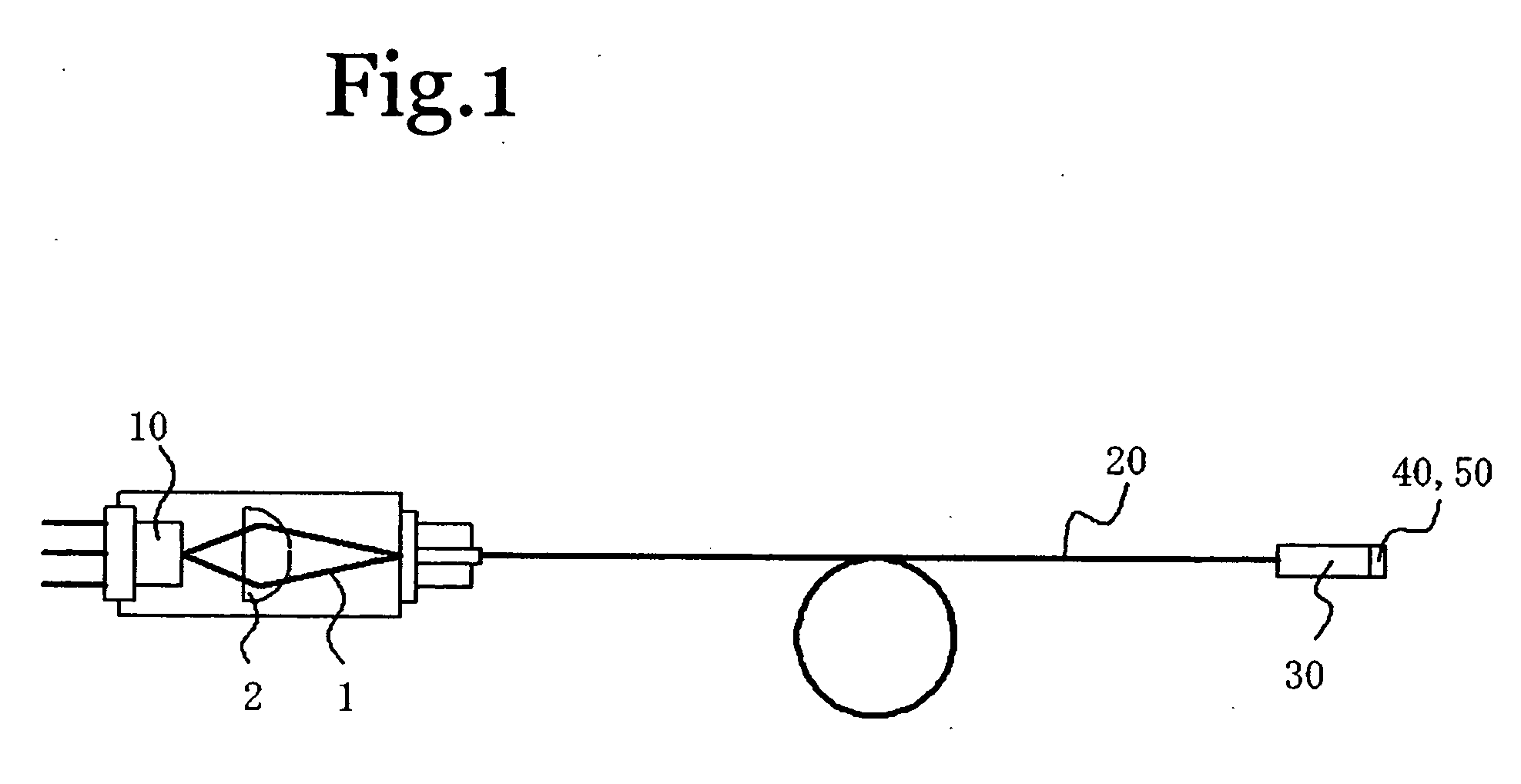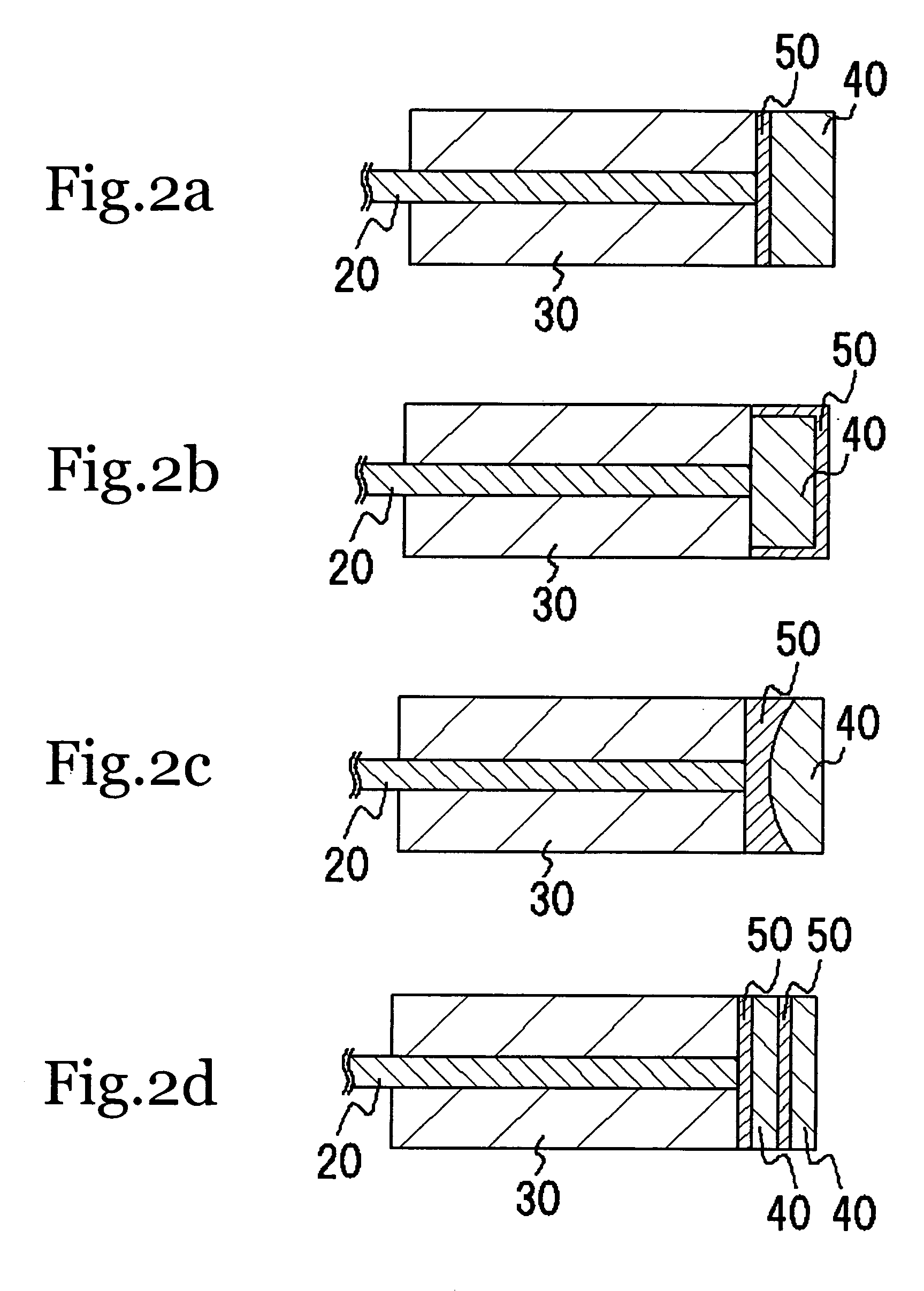Light emitting device
a technology conversion member, which is applied in the direction of microscope, vehicle headlamp, spectral modifier, etc., can solve the problems of unusability of light emitting device, conversion member discoloration, and light from the light emitting element cannot be fully emitted to the outside, and achieves long service life and high output
- Summary
- Abstract
- Description
- Claims
- Application Information
AI Technical Summary
Benefits of technology
Problems solved by technology
Method used
Image
Examples
embodiment 1
[0054] The light emitting device in this embodiment, as shown in FIGS. 1 and 2a, mainly comprises the light emitting element 10, the light guide member 20, the covering member 30, the wavelength conversion member 40, and the heat conduction member 50. A lens 2 for converging light 1 from the light emitting element 10 is provided on the front face of the light emitting element 10.
[0055] An LD composed of a GaN (gallium nitride)-based semiconductor having an emission peak wavelength near 445 nm is used as the light emitting element 10, a quartz SI-type optical fiber (core diameter of 114 μm, cladding diameter of 125 μm) is used as the light guide member 20, the covering member 30 is composed of alumina and had a diameter of 0.7 mm, the wavelength conversion member 40 comprises two kinds of fluorescent material, namely, 0.53 g of Lu3Al5O12:Ce (emits green light) and 0.2 g of (Sr,Ca)2Si5N8:Eu (emits red light), contained in 1.1 g of silicone resin, and AlN (film thickness of 0.1 mm) is...
embodiment 2
[0057] The light emitting device in this embodiment, as shown in FIG. 2e, is the same as in Embodiment 1 except that the heat conduction member 50 was formed from ITO. The ITO was formed by sputtering.
[0058] With this light emitting device, degradation of the wavelength conversion member 40 by heat is greatly reduced as compared to a light emitting device not equipped with the heat conduction member 50. As a result, a reliable light emitting device of high emission output can be obtained.
[0059] Furthermore, the present invention can be a light emitting device in which two or more of the unit shown in FIG. 1 are combined. In this case, it is preferable for the wavelength conversion member 40 and the heat conduction member 50 both to be constituted by a single member. Also, the light that is ultimately obtained is not limited to white light, and can instead be green light, for instance.
embodiment 3
[0060] With the light emitting device in this embodiment, as shown in FIG. 5m, an LD composed of a GaN (gallium nitride)-based semiconductor having an emission peak wavelength near 405 nm was used as the light emitting element 10, and a heat conduction member 50 composed of ITO (film thickness of 300 nm) was sandwiched between glass and the wavelength conversion member 40. The ITO was formed by sputtering.
[0061] The wavelength conversion member 40 was formed by mixing as fluorescent substances 2 g of Ca10(PO4)6Cl2:Eu (emits blue light) with 2 g of a liquid mixture of ethyl cellulose and terpineol (weight ratio=12:88), and sintering this mixture for 30 minutes at 80° C., 10 minutes at 200° C., and 1 hour at 500° C. to bake the fluorescent substance. The thickness of the wavelength conversion member 40 was about 500 μm, for example.
[0062] Alternatively, the fluorescent substance was a mixture of 10 g of Ca10(PO4)6Cl2:Eu (emits blue light), 100 g of isopropyl alcohol, 20 g of alumina...
PUM
 Login to View More
Login to View More Abstract
Description
Claims
Application Information
 Login to View More
Login to View More - R&D
- Intellectual Property
- Life Sciences
- Materials
- Tech Scout
- Unparalleled Data Quality
- Higher Quality Content
- 60% Fewer Hallucinations
Browse by: Latest US Patents, China's latest patents, Technical Efficacy Thesaurus, Application Domain, Technology Topic, Popular Technical Reports.
© 2025 PatSnap. All rights reserved.Legal|Privacy policy|Modern Slavery Act Transparency Statement|Sitemap|About US| Contact US: help@patsnap.com



